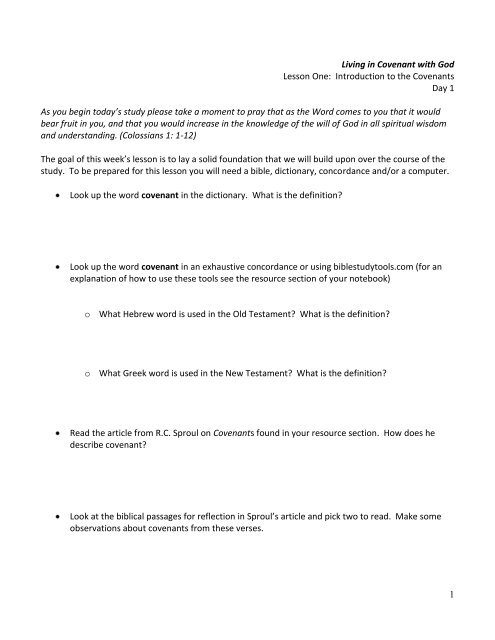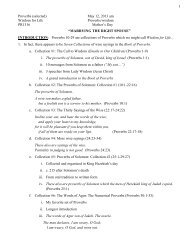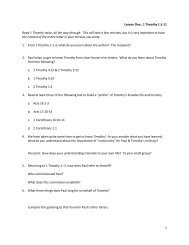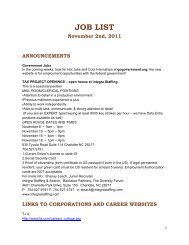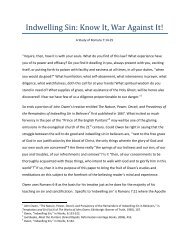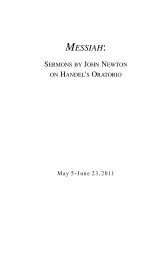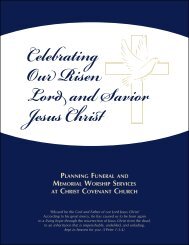Intro to Covenants - Christ Covenant Church
Intro to Covenants - Christ Covenant Church
Intro to Covenants - Christ Covenant Church
Create successful ePaper yourself
Turn your PDF publications into a flip-book with our unique Google optimized e-Paper software.
Living in <strong>Covenant</strong> with God<br />
Lesson One: <strong>Intro</strong>duction <strong>to</strong> the <strong><strong>Covenant</strong>s</strong><br />
Day 1<br />
As you begin <strong>to</strong>day’s study please take a moment <strong>to</strong> pray that as the Word comes <strong>to</strong> you that it would<br />
bear fruit in you, and that you would increase in the knowledge of the will of God in all spiritual wisdom<br />
and understanding. (Colossians 1: 1-12)<br />
The goal of this week’s lesson is <strong>to</strong> lay a solid foundation that we will build upon over the course of the<br />
study. To be prepared for this lesson you will need a bible, dictionary, concordance and/or a computer.<br />
Look up the word covenant in the dictionary. What is the definition?<br />
Look up the word covenant in an exhaustive concordance or using biblestudy<strong>to</strong>ols.com (for an<br />
explanation of how <strong>to</strong> use these <strong>to</strong>ols see the resource section of your notebook)<br />
o What Hebrew word is used in the Old Testament? What is the definition?<br />
o What Greek word is used in the New Testament? What is the definition?<br />
Read the article from R.C. Sproul on <strong><strong>Covenant</strong>s</strong> found in your resource section. How does he<br />
describe covenant?<br />
Look at the biblical passages for reflection in Sproul’s article and pick two <strong>to</strong> read. Make some<br />
observations about covenants from these verses.<br />
1
The Westminster Shorter Catechism begins with the following questions and answers. Fill in the blanks,<br />
you can find the WSC online if you do not have a copy.<br />
Q: What is the chief end of man?<br />
A: Man’s chief end is <strong>to</strong> ____________, and _______________ forever.<br />
Q: What rule hath God given <strong>to</strong> direct us how we may glorify and enjoy him?<br />
A: The _______________, which is contained in the Scriptures of the Old and New<br />
Testaments, is the only rule <strong>to</strong> direct us how we may glorify and enjoy him.<br />
Let’s consider what does the Scripture say about how we can glorify and enjoy God.<br />
Read the following quote from the book <strong>Covenant</strong> Theology by Michael Hor<strong>to</strong>n. His writing is<br />
academic in nature so do not feel discouraged if you have <strong>to</strong> read through it several times <strong>to</strong> get<br />
the meaning.<br />
“So what brings all these *biblical+ themes <strong>to</strong>gether? What unites [all of<br />
scripture+ is not itself a central dogma but…a matrix of beams and pillars that<br />
hold <strong>to</strong>gether the structure of biblical faith and practice. That particular<br />
architectural structure that we believe the Scriptures themselves <strong>to</strong> yield is the<br />
covenant. It is not simply the concept of the covenant, but the concrete<br />
existence of God’s covenantal dealings in our his<strong>to</strong>ry that provides the context<br />
within which we recognize the unity of Scripture amid its remarkable variety.”<br />
What is Hor<strong>to</strong>n saying?<br />
Simply put, the bible tells us that we glorify God and enjoy him by living in covenant with him.<br />
Understanding what it means <strong>to</strong> live in covenant with God is foundational <strong>to</strong> understanding Scripture<br />
and our role as a disciple of <strong>Christ</strong>. This study is dedicated <strong>to</strong> understanding <strong>Covenant</strong> theology by<br />
taking a close look at the particular covenants that God makes with Adam, Noah, Abraham, Moses,<br />
David, and <strong>Christ</strong>.<br />
Take a moment <strong>to</strong> write down questions that you would like <strong>to</strong> discuss with your leaders.<br />
2
Living in <strong>Covenant</strong> with God<br />
Lesson One: <strong>Intro</strong>duction <strong>to</strong> the <strong><strong>Covenant</strong>s</strong><br />
Day 2<br />
As you begin study please take a moment <strong>to</strong> pray that as the Word comes <strong>to</strong> you that it would bear fruit<br />
in you and that you would increase in the knowledge of the will of God in all spiritual wisdom and<br />
understanding. (Colossians 1:1-12)<br />
The Bible is a his<strong>to</strong>rical book and we must study it as such if we want <strong>to</strong> understand its full meaning. As<br />
we think about living in covenant with God, we will gain understanding of Scripture by looking at “extrabiblical”<br />
(not in the Bible) covenants of the time. Two types of covenants found in other his<strong>to</strong>rical<br />
accounts are “Suzerain-vassal treaties” and “Royal Grant <strong><strong>Covenant</strong>s</strong>”. Read the explanations of each<br />
below. As you read, underline or highlight the information that seems most pertinent and particular <strong>to</strong><br />
each type of treaty.<br />
"Suzerain Treaties & The <strong>Covenant</strong> Documents the Bible"<br />
In the Ancient Near East, treaties between kings<br />
were common. These were treaties drawn up among<br />
equals and mostly outlined agreements <strong>to</strong> honor<br />
each other's boundaries, <strong>to</strong> maintain trade relations,<br />
and return run-away slaves. These treaties are<br />
preserved in the Mari Tablets and in the Amarna<br />
texts. Also preserved in these collections are treaties<br />
drafted between a superior and his inferior. If the<br />
relationship was familial or friendly, the parties are<br />
referred <strong>to</strong> as "father" and "son." If the relationship<br />
is bereft of kindness and intimacy, the parties are<br />
referred <strong>to</strong> as "lord" and "servant," or "king" and<br />
"vassal," or "greater king" and "lesser king." The<br />
greater king is the suzerain and the lesser king is a<br />
prince, or a lesser lord in the service of the greater<br />
king. The lesser lord is a representative of all the<br />
common people who are under the protection of the<br />
greater king. He enforces the treaty among the<br />
masses.<br />
These Suzerain/Vassal treaties open with two<br />
sections: 1) The identification of the Suzerain by his<br />
name and titles; 2) The his<strong>to</strong>rical survey of the<br />
Suzerain's dealings with the vassal. The purpose is <strong>to</strong><br />
illustrate <strong>to</strong> the vassal how much the Suzerain has<br />
done <strong>to</strong> protect and establish the vassal who<br />
therefore owes submission and allegiance <strong>to</strong> the<br />
Suzerain. These two sections are referred <strong>to</strong> as the<br />
"Preamble."<br />
The next section of these treaties lists the<br />
"stipulations." What the vassal is required <strong>to</strong> do is<br />
spelled out in principal and detail. This section is<br />
often concluded with the requirement that the<br />
vassal deposit his copy of the treaty in his temple,<br />
where he is <strong>to</strong> occasionally read and study it <strong>to</strong><br />
refresh his memory concerning his duties.<br />
The last section of these treaties contains the<br />
blessings and curses of the Suzerain. If the<br />
stipulations are met by the vassal, he will receive the<br />
Suzerain's blessings, which are listed. If the vassal<br />
fails <strong>to</strong> meet the stipulations, he will receive the<br />
Suzerain's curses, which are also listed.<br />
The Suzerain would keep one copy of the treaty and<br />
the vassal would keep one copy of the treaty. A<br />
number of ratifying ceremonies were used<br />
depending upon the era and culture. But the most<br />
widely used rite was that of cutting the bodies of<br />
animals in halves and placing them in two rows with<br />
enough space between for the two parties ofthe<br />
treaty <strong>to</strong> walk side by side. As they walked between<br />
the pieces, they were vowing <strong>to</strong> each other, "May<br />
what has happened <strong>to</strong> these animals, happen <strong>to</strong> me<br />
if I break this covenant with you. 1<br />
1 Notes from lectures of Dr. Meredith Kline<br />
3
Royal Grant Treaties<br />
In Royal Grant <strong><strong>Covenant</strong>s</strong> the king (or suzerain) commits himself <strong>to</strong> the good of the servant (or vassal)<br />
“1. This type of covenant was usually perpetual with no specific conditions. It was, however, unders<strong>to</strong>od<br />
that the behavior of the heirs would continue <strong>to</strong> follow the original recipient's loyal example.<br />
2. Most covenants of this type contained the same kind of blessings and curses found in the Vassal<br />
<strong>Covenant</strong>.” 2<br />
Biblical <strong><strong>Covenant</strong>s</strong> & His<strong>to</strong>rical Treaty Types<br />
Suzerain-vassal Treaties<br />
<strong>Covenant</strong> with Moses<br />
<strong>Covenant</strong> with David<br />
Royal Grant Treaties<br />
<strong>Covenant</strong> with Noah<br />
<strong>Covenant</strong> with Abraham<br />
New <strong>Covenant</strong><br />
Given what you have learned…<br />
In biblical covenants who is the suzerain/king? What does that mean?<br />
Who are the vassals/servants? What does that mean?<br />
Let’s consider some Biblical examples <strong>to</strong> put it all <strong>to</strong>gether.<br />
Read Deuteronomy 10:12-22. (A Suzerain-Vassal treaty)<br />
o How does God describe himself as the suzerain/sovereign? What names and titles does<br />
He use?<br />
o How are God’s people described as servants/vassals? How does God describe His<br />
dealings with them?<br />
o What are His requirements for His people/vassals?<br />
2 Goundry, 2007<br />
4
o What blessings and/or curses does He present?<br />
Read Genesis 9: 8-17 (A Royal Grant <strong>Covenant</strong>)<br />
o Does God show himself committed <strong>to</strong> the good of his servants? How?<br />
o Are there any specific requirements?<br />
What do you understand <strong>to</strong> be the difference between a Suzerain-Vassal treaty and a Royal Grant<br />
<strong>Covenant</strong>?<br />
As you think about the people of Israel, describe what life was like under both kinds of treaties.<br />
Suzerain-Vassal life…<br />
Royal Grant life….<br />
Remember that our goal is <strong>to</strong> understand living in covenant with God so that we might better<br />
understand Scripture and our role as disciples of <strong>Christ</strong>! Take a moment <strong>to</strong> summarize what you have<br />
learned about covenants <strong>to</strong>day and write down any questions that you would like <strong>to</strong> discuss with your<br />
leader.<br />
5
Living in <strong>Covenant</strong> with God<br />
Lesson One: <strong>Intro</strong>duction <strong>to</strong> the <strong><strong>Covenant</strong>s</strong><br />
Day 3<br />
As you begin study please take a moment <strong>to</strong> pray that as the Word comes <strong>to</strong> you that it would bear fruit<br />
in you and that you would increase in the knowledge of the will of God in all spiritual wisdom and<br />
understanding. (Colossians 1:1-12)<br />
Yesterday we looked at covenants in a his<strong>to</strong>rical sense. Today we are going <strong>to</strong> explore covenants as<br />
relationships.<br />
Which of the following terms apply <strong>to</strong> your idea of “relationship”?<br />
parties obligations rules rewards/consequences interaction<br />
Which apply <strong>to</strong> what you have learned about “covenant”?<br />
parties obligations rules rewards/consequences interaction<br />
To say that God is covenantal is <strong>to</strong> say that He is relational. We are going <strong>to</strong> learn about how God<br />
relates <strong>to</strong> His people by looking at the various covenants. As a foundation it is important <strong>to</strong> note the<br />
covenantal/relational nature of God within Himself.<br />
Read Genesis 1:26.<br />
o What is the pronoun used <strong>to</strong> describe the Crea<strong>to</strong>r? Is it singular or plural?<br />
Read Malachi 2:10 and Deut 6:4.<br />
o What do these verses tell us about our God?<br />
One of the great conundrums of our faith is that our God is triune. He is one yet exists in three<br />
distinct persons. We are not going <strong>to</strong> explore the Trinity in depth in this study, however it is<br />
important <strong>to</strong> note as we look at the covenantal nature of God. God is relational even within Himself.<br />
He ultimately exists in covenant! God chooses <strong>to</strong> relate <strong>to</strong> us within a covenant because it is an<br />
overflow of His nature.<br />
What about God’s relationship, His covenant, with His people? Read Malachi 2:5-6.<br />
In these verses the Lord speaks of his covenant with Levi. Reread the passage substituting the<br />
word “relationship” for “covenant.” What do you find?<br />
6
To consider how broadly this relationship/covenant principle applies, look up the word<br />
“covenant” in the concordance in the back of your Bible. Pick two passages that deal with<br />
covenant.<br />
o Read each passage, substituting the word “relationship” for the word “covenant”?<br />
o Do these verses maintain their meaning with the substitution? Why or why not?<br />
God is in “covenant /relationship” with His people. Each covenant contains three basic elements that<br />
define its character.<br />
Plurality: covenants made with individuals are meant <strong>to</strong> be expressed in groups<br />
o Read Genesis 2:18. How do you see the “plurality” of God’s covenant with Adam?<br />
Personality: God is personally involved with the people He makes covenant with<br />
o Read Genesis 2:7. How do you see the “personal” nature of God’s covenant with Adam?<br />
Purpose: there is a purpose in each covenant<br />
o Read Genesis 1:28. How do you see the “purpose” of God’s covenant with Adam?<br />
Remember that our goal is <strong>to</strong> understand living in covenant with God so that we might better<br />
understand Scripture and our role as disciples of <strong>Christ</strong>! In conclusion, take in<strong>to</strong> consideration all that<br />
you have learned about covenants thus far and write it down. What questions do you have?<br />
7
Living in <strong>Covenant</strong> with God<br />
Lesson One: <strong>Intro</strong>duction <strong>to</strong> the <strong><strong>Covenant</strong>s</strong><br />
Day 4<br />
As you begin <strong>to</strong>day’ s study please take a moment <strong>to</strong> pray that as the Word comes <strong>to</strong> you that it would<br />
bear fruit in you, and that you would increase in the knowledge of the will of God in all spiritual wisdom<br />
and understanding. (Colossians 1:1-12)<br />
Let’s look at O.Palmer Robertson’s definition of a covenant. According <strong>to</strong> Robertson, a covenant is:<br />
“ a bond in blood sovereignly administered”<br />
What is a “bond”?<br />
What does it mean that a bond is “sovereignly administered”?<br />
What do you think about when you hear the statement “bond in blood?”<br />
Often when we think about blood we think of something gruesome, but it also reminds us of life.<br />
How so?<br />
To say that a bond is “in blood” is <strong>to</strong> say that it correlates <strong>to</strong> death (gruesome) and life (hopeful).<br />
Read Hebrews 9:15-22.<br />
What do you learn from this passage about a covenant being a “bond in blood”?<br />
According <strong>to</strong> the writer, why is the blood necessary?<br />
Let’s explore the conduct of biblical covenants and their signs and/or seals. How do covenants “work”?<br />
Good question!<br />
The conduct of covenants is evidenced in the following three elements:<br />
1. Parties: who is involved<br />
8
2. Conditions: the rules <strong>to</strong> which each party must adhere<br />
3. Consequences: the blessings for obedience and curses for disobedience<br />
Think of a relationship that you have…spouse, parent, roommate, boyfriend, or friend<br />
Who are the parties?<br />
What are the conditions? (Rules for interaction/commitments)<br />
What are some of the consequences? (what will happen if the rules are kept? If they are<br />
broken?)<br />
Read the passage below <strong>to</strong> consider the “conduct” of the God’s covenant with His people.<br />
Malachi 2:1-9<br />
Parties Conditions Consequences<br />
How is it helpful for you <strong>to</strong> understand the conduct of God’s covenant with His people?<br />
Signs and seals are the ratification of covenants.<br />
Look up “ratification” in a dictionary. What does it mean?<br />
For clarity let’s look at the covenant of marriage.<br />
Read Mark 10:6-9<br />
o Is marriage a bond? How so?<br />
9
o Is this bond “in blood”, remember that this also means a bond in life or death?<br />
o Is it sovereignly administered?<br />
o When a man and women marry, what is the sign and seal of this marriage? (Hint: it is how<br />
you distinguish between people who are married and single)<br />
o What is the purpose of this sign and seal?<br />
A wedding ring identifies a man or woman with the covenant that they have made, and serves <strong>to</strong><br />
remind them of this bond.<br />
Anytime we see a sign and seal in biblical covenants, it serves <strong>to</strong> remind the people of and identify them<br />
with a “bond and blood sovereignly administered.”<br />
Take a moment <strong>to</strong> reflect on what you have learned <strong>to</strong>day and summarize it below.<br />
10
Living in <strong>Covenant</strong> with God<br />
Lesson One: <strong>Intro</strong>duction <strong>to</strong> the <strong><strong>Covenant</strong>s</strong><br />
Day 5<br />
As you begin <strong>to</strong>day’ s study please take a moment <strong>to</strong> pray that as the Word comes <strong>to</strong> you that it would<br />
bear fruit in you, and that you would increase in the knowledge of the will of God in all spiritual wisdom<br />
and understanding. (Colossians 1:1-12)<br />
Each week in our study we are going <strong>to</strong> devote a day <strong>to</strong> seeing <strong>Christ</strong> in the <strong>Covenant</strong>. Each one<br />
whispers his name!<br />
On day one we found that the chief end of man is <strong>to</strong>_________________,<br />
And that we learn how <strong>to</strong> do this in the ____________________.<br />
Scripture tells us that we glorify and enjoy God by living in___________ with him.<br />
Read John 10:10.<br />
Why does <strong>Christ</strong> say that he has come?<br />
Read John 15.<br />
How do we experience “abundant life” in <strong>Christ</strong>?<br />
How does John 15 describe our covenant relationship with Jesus?<br />
What does <strong>Christ</strong> have <strong>to</strong> do with us living in covenant with God?<br />
This week we have looked at covenants as if from the window of an airplane, from 20,000 feet. If things<br />
look blurry, do not be discouraged! Houses look blurry from this distance, but the details become much<br />
clearer when you observe them “up close and personal”, inside and out. In the following weeks we are<br />
going <strong>to</strong> get a closer look!<br />
Let’s spend a few minutes reviewing what we have learned.<br />
What is a covenant?<br />
11
Why is it important <strong>to</strong> understand covenants?<br />
What do we learn from Suzerain-Vassal treaties and Royal Grants about covenants?<br />
How are the terms “covenant” and “relationship” interchangeable?<br />
Describe the elements of the character of a covenant?<br />
Describe the elements of the conduct of a covenant?<br />
What is O. Palmer Robertson’s definition of covenant?<br />
Reflect on this week’s lesson.<br />
What have you learned about God?<br />
What have you learned about yourself?<br />
What questions do you have <strong>to</strong> discuss during your small group?<br />
12


